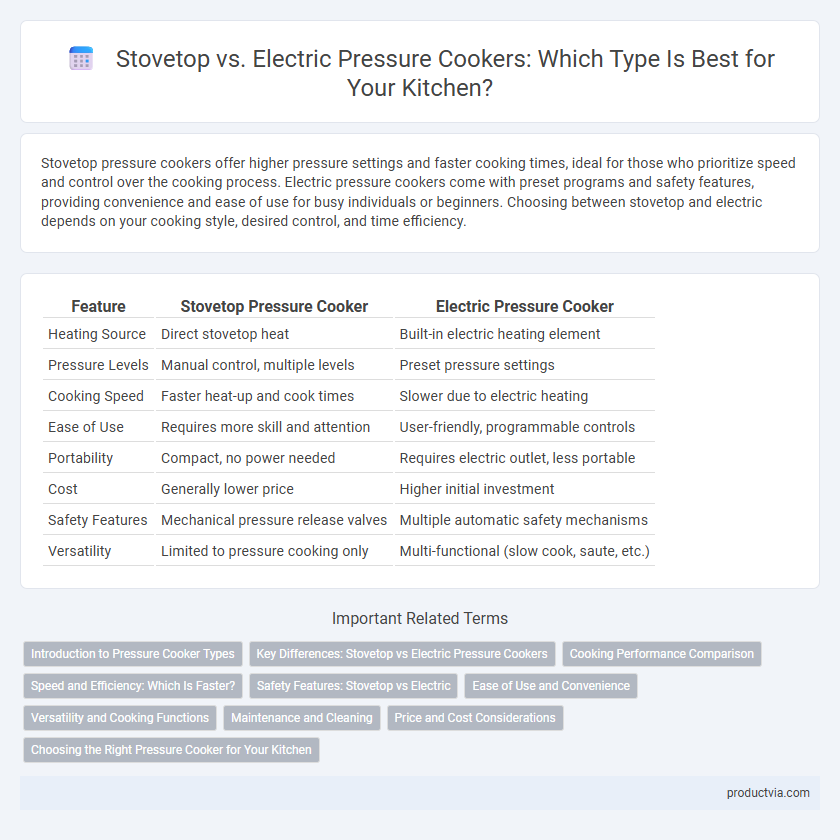Stovetop pressure cookers offer higher pressure settings and faster cooking times, ideal for those who prioritize speed and control over the cooking process. Electric pressure cookers come with preset programs and safety features, providing convenience and ease of use for busy individuals or beginners. Choosing between stovetop and electric depends on your cooking style, desired control, and time efficiency.
Table of Comparison
| Feature | Stovetop Pressure Cooker | Electric Pressure Cooker |
|---|---|---|
| Heating Source | Direct stovetop heat | Built-in electric heating element |
| Pressure Levels | Manual control, multiple levels | Preset pressure settings |
| Cooking Speed | Faster heat-up and cook times | Slower due to electric heating |
| Ease of Use | Requires more skill and attention | User-friendly, programmable controls |
| Portability | Compact, no power needed | Requires electric outlet, less portable |
| Cost | Generally lower price | Higher initial investment |
| Safety Features | Mechanical pressure release valves | Multiple automatic safety mechanisms |
| Versatility | Limited to pressure cooking only | Multi-functional (slow cook, saute, etc.) |
Introduction to Pressure Cooker Types
Stovetop pressure cookers are known for their high-pressure capabilities, typically reaching up to 15 psi, which enables faster cooking times and more versatile meal preparation. Electric pressure cookers offer programmable settings and consistent temperature control, making them ideal for users seeking convenience and ease of use. Both types vary in materials, safety features, and size options, catering to different cooking preferences and kitchen setups.
Key Differences: Stovetop vs Electric Pressure Cookers
Stovetop pressure cookers offer faster cooking times and higher pressure settings, ideal for precise temperature control and durability. Electric pressure cookers provide convenience with programmable functions, built-in timers, and automatic pressure release for hands-free cooking. Choosing between stovetop and electric depends on preferences for speed, control, and smart cooking features.
Cooking Performance Comparison
Stovetop pressure cookers generally reach higher pressures and maintain consistent heat levels, resulting in faster cooking times and better texture for dense foods. Electric pressure cookers offer precision with programmable settings and temperature control, enhancing convenience but often with slightly slower cooking performance. The choice depends on whether speed and pressure customization or ease of use and automation are prioritized.
Speed and Efficiency: Which Is Faster?
Stovetop pressure cookers typically reach higher pressures faster than electric models, resulting in shorter cooking times. Electric pressure cookers offer convenience with programmable settings but usually take longer to heat up and release pressure. For speed and efficiency, stovetop variants are generally faster, making them ideal for quick meal preparation.
Safety Features: Stovetop vs Electric
Stovetop pressure cookers typically feature basic mechanical safety valves and pressure indicators, relying on a manual release system that demands user attention to prevent overpressure. Electric pressure cookers integrate multiple automated safety mechanisms such as lid-locking systems, temperature sensors, and electronic pressure controls that minimize user error and enhance safety during operation. The advanced safety features in electric models provide more consistent pressure regulation and reduce the risk of accidents compared to the more hands-on safety management required with stovetop types.
Ease of Use and Convenience
Stovetop pressure cookers offer precise temperature control and faster cooking times, making them ideal for experienced users who prioritize speed. Electric pressure cookers provide programmable settings and safety features, enhancing ease of use for beginners and those seeking hands-free operation. The convenience of an electric model lies in its automated pressure regulation, while stovetop versions require manual monitoring.
Versatility and Cooking Functions
Stovetop pressure cookers offer superior versatility with rapid temperature adjustments and the ability to achieve higher pressures, making them ideal for a wide range of cooking techniques including searing and sauteing before pressure cooking. Electric pressure cookers provide multiple preset cooking functions such as slow cooking, steaming, and yogurt making, enhancing convenience and multi-functionality for busy households. Choosing between stovetop and electric models depends on whether precision control or automated versatility aligns better with your culinary needs.
Maintenance and Cleaning
Stovetop pressure cookers require manual cleaning of individual parts such as the gasket, valve, and lid, which can accumulate food residue and need regular inspection to ensure safety. Electric pressure cookers often feature dishwasher-safe components and non-stick inner pots, simplifying maintenance and reducing cleaning time. Both types demand routine gasket replacement to maintain pressure integrity, but electric models generally offer more user-friendly maintenance with digital alerts for upkeep.
Price and Cost Considerations
Stovetop pressure cookers typically have a lower upfront cost, ranging from $30 to $100, whereas electric models start around $70 and can exceed $200. Electric pressure cookers often consume more electricity, increasing operational costs slightly compared to the gas usage of stovetop versions. Lifespan and maintenance expenses also vary, with stovetop cookers generally requiring fewer repairs and lasting longer, making them more cost-effective over time.
Choosing the Right Pressure Cooker for Your Kitchen
Stovetop pressure cookers provide higher pressure levels and faster cooking times, ideal for experienced cooks seeking versatility and durability. Electric pressure cookers offer programmable settings and safety features, best suited for convenience-focused users and busy kitchens. Choosing the right pressure cooker depends on your cooking style, desired control, and available kitchen space.
Stovetop vs Electric for Pressure Cooker Type Infographic

 productvia.com
productvia.com